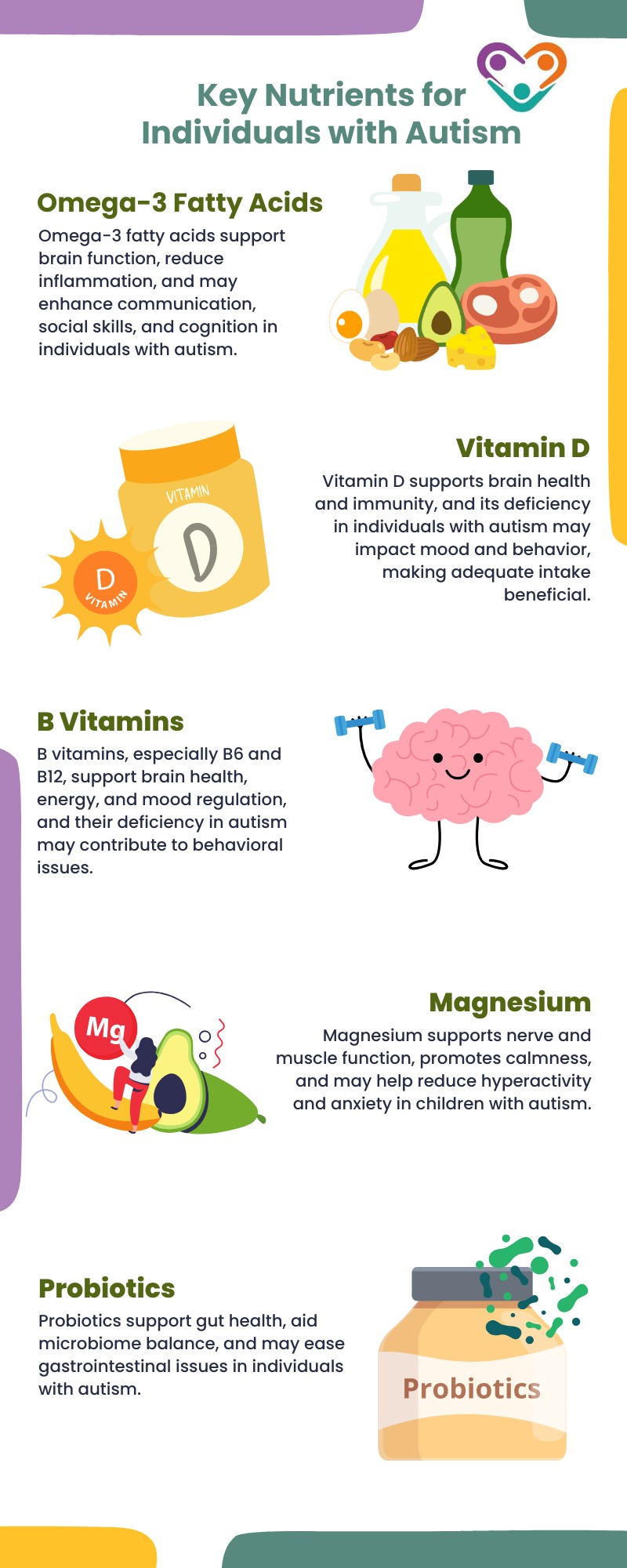Nutrition plays a significant role in overall health, but for individuals on the autism spectrum, it can have an even more profound impact. Many parents and caregivers of children with autism have noticed how certain foods or dietary practices can influence behavior, sensory sensitivity, and cognitive function.
As autism spectrum disorder affects individuals differently, there is no one-size-fits-all approach when it comes to nutrition. However, understanding how proper nutrition can support both physical and mental well-being is crucial for parents and caregivers. One aspect to consider is the tendency for some individuals to engage in overeating, which can affect their overall health and well-being. Identifying and addressing this behavior can make a significant difference in supporting a balanced and healthy lifestyle.
That said, we will explore the relationship between nutrition and autism while highlighting the importance of a well-balanced diet and how specific dietary changes can support individuals with autism.
Understanding the Link Between Nutrition and Autism
Nutrition can impact the brain, gut, and immune system, all of which are involved in autism. Research suggests that certain nutrients play a vital role in cognitive function and behavior.
For example, omega-3 fatty acids, antioxidants, and certain vitamins and minerals are known to support brain development and reduce inflammation. On the other hand, imbalances in gut health and nutrient deficiencies can exacerbate behavioral issues and other autism-related symptoms.
One area that has gained increasing attention in autism research is the gut-brain connection. Individuals with autism often experience gastrointestinal (GI) issues such as constipation, diarrhea, and abdominal pain.
These symptoms can be linked to imbalances in the gut microbiome – the community of bacteria and other microorganisms living in the digestive system.
Recent studies have shown that individuals with autism may have an altered microbiome compared to neurotypical individuals, which can contribute to gastrointestinal discomfort and influence brain function.
Since the gut and brain are closely connected, maintaining a healthy gut microbiome through proper nutrition is crucial in managing autism symptoms.
The Role of a Balanced Diet in Autism Management
A balanced diet is essential for individuals with autism to support their overall health and development. A healthy diet consists of a variety of nutrients from different food groups, including fruits, vegetables, whole grains, proteins, and healthy fats. These nutrients provide energy, support immune function, and promote proper brain and cognitive development.
For individuals with autism, a balanced diet can also address common concerns such as sensory issues, hyperactivity, and difficulty focusing. By providing the right mix of nutrients, caregivers can support a child’s physical and cognitive abilities and potentially reduce some challenging behaviors.
That said, the key nutrients that play a major role in the nutrition of autistic individuals are as follows:

Supporting a Healthy Relationship with Food
While dietary changes can help improve symptoms of autism, it’s equally important to promote a healthy relationship with food. For many children with autism, food can become a source of stress, anxiety, or control. Caregivers can support a positive attitude toward food by making mealtimes enjoyable and stress-free.
Here are some tips that parents and caregivers can follow to encourage healthy eating habits:
- Create a Routine: Establish a consistent mealtime routine to help children feel secure and comfortable. Having meals at the same time every day can reduce anxiety around food.
- Introduce New Foods Gradually: If your child is a selective eater, introduce new foods gradually, and pair them with familiar favorites. This can help reduce resistance to trying new foods.
- Focus on Texture and Presentation: Experiment with different textures and creative food presentations to make meals more appealing. For example, you can cut vegetables into fun shapes or serve them with a favorite dip.
- Incorporate Sensory-Friendly Foods: Choose foods that appeal to your child’s sensory preferences. If they prefer bland foods, try incorporating mild flavors or spices to make the food more interesting.
- Model Healthy Eating: Children often mimic the behavior of their parents or caregivers. Set a good example by eating healthy foods yourself and making mealtimes a positive experience.
Nutrition plays a critical role in the well-being of individuals with autism. A well-balanced diet that addresses specific nutritional needs can improve cognitive function, behavior, and overall quality of life. By understanding the link between nutrition and autism, caregivers can make informed decisions about their children’s dietary needs and help them thrive.
Conclusion
Whether through specialized diets or simply promoting healthy eating habits, the impact of proper nutrition cannot be underestimated. By working with healthcare providers, parents can create a personalized nutrition plan that best supports the unique needs of their child with autism.
With patience, consistency, and the right dietary approach, individuals with autism can experience improvements in their health and well-being, allowing them to live more fulfilling lives. At Golden Care Therapy, we offer high-quality ABA therapy tailored to meet the unique needs of each individual.
If you’re looking for autism services in New Jersey, Indiana, New York, Georgia, or Florida, we’re here to help. Contact us today to learn how our compassionate and dedicated team can support you or your loved one in achieving meaningful progress.

